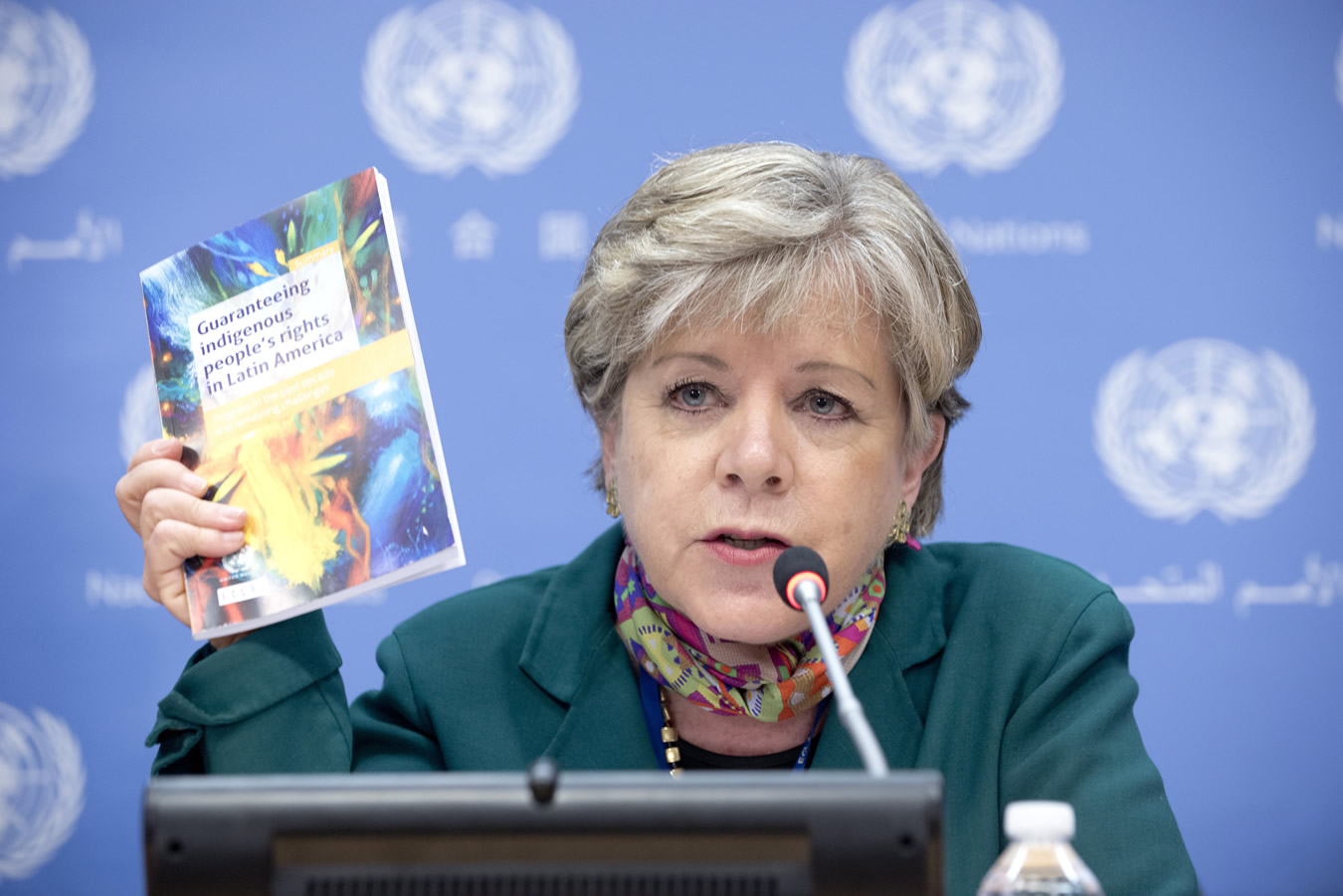ECLAC's Executive Secretary Concludes Visit to New York
Work area(s)
Alicia Bárcena participated this week in various meetings related to climate change, indigenous peoples, financing for development, the post-2015 agenda and statistics.

(26 September 2014) The Executive Secretary of the Economic Commission for Latin America and the Caribbean (ECLAC), Alicia Bárcena, attended the World Conference on Indigenous Peoples and the Climate Summit this week in New York, while also accompanying the United Nations Secretary-General, Ban Ki-moon, in bilateral meetings with numerous Latin American presidents.
Bárcena participated in meetings with the presidents of Bolivia, Evo Morales; Brazil, Dilma Rousseff; Chile, Michelle Bachelet; Colombia, Juan Manuel Santos; Honduras, Juan Orlando Hernández; Mexico, Enrique Peña Nieto; Peru, Ollanta Humala; and Panama, Juan Carlos Varela; as well as with the Cuban Minister of Foreign Affairs, Bruno Rodríguez Parrilla.
On Monday, September 22, Bárcena gave a press conference to media accredited in New York, where she referred to ECLAC's most recent work in terms of indigenous peoples and climate change. Those reports are Guaranteeing indigenous people's rights in Latin America: progress in the past decade and remaining challenges and The economics of climate change in Latin America and the Caribbean: Paradoxes and challenges.
On Tuesday, September 23, indigenous leaders discussed the main results of the report on their segment of the population. This included David Choquehuanca, Bolivia's Foreign Affairs Minister; Rigoberta Menchú, a Nobel Peace Prize winner; Alvaro Pop, member of the Permanent Forum on Indigenous Issues; and Mirna Cunningham, ex-president of the same organization. The debate was moderated by Martí Abregú, vice president of the Ford Foundation, which co-organized the event.
On Wednesday, September 24, the Executive Secretary moderated the high level meeting Strengthening the Post-2015 Agenda-Voices of Experience, co-hosted by the governments of Bangladesh, Colombia and Sweden, along with civil society organizations.
"Civil society is a knowledgeable and experienced partner in the discussions for an ambitious post-2015 development agenda. They are a barometer to know if we as an international community are aiming high enough," Bárcena said.
The participants in that event included Qazi Kholiquzzaman Ahmad, of the Bangladeshi Prime Minister's delegation to the General Assembly and the Climate Summit; Kajsa Olofsgård, Sweden's Post-2015 Ambassador; and Amina Mohammed, the UN Secretary-General's Special Adviser on Post-2015 Development Planning, among others.
Bárcena participated in another sideline event organized by the Leading Group on Innovative Financing for Development, whose subject was financing for development and climate.
That gathering was attended by Denis Sassou-Nguesso, President of the Republic of Congo, María Fernanda Villegas, Chile's Minister for Social Development; Annick Girardin, France's Secretary of State for Development; Philippe Douste-Blazy, the UN Secretary-General's Special Adviser on Innovative Financing for Development; Anne Sipiläinen, Finland's Under Secretary of State for Development; and Erik Solheim, Chair of the Organization for Economic Co-operation and Development's (OECD) Development Cooperation Directorate.
"We want to change the development paradigm, but we cannot do that without also changing the financing paradigm. We need to ensure that the principle of shared but differentiated responsibilities is fulfilled, which is to say that some countries have more responsibilities in terms of financing and we are not going to leave anyone behind, especially the middle-income countries and the Small Island Developing States," Bárcena said.
Finally, as part of her trip to New York, ECLAC's Executive Secretary on Thursday, September 25, participated as a member in a meeting of the Independent Expert Advisory Group on the Data Revolution for Sustainable Development, which was established in August by Ban Ki-moon.
Related content
Side-event "Los pueblos indígenas en América Latina: avances en el último decenio y retos pendientes para el respeto de sus derechos"
Side event en el marco de la Thirteenth session of the UN Permanent Forum on Indigenous Issues.
Author
Related link(s)
Country(ies)
-
United States
Contact
Public Information Unit
- prensa@cepal.org
- (56 2) 2210 2040